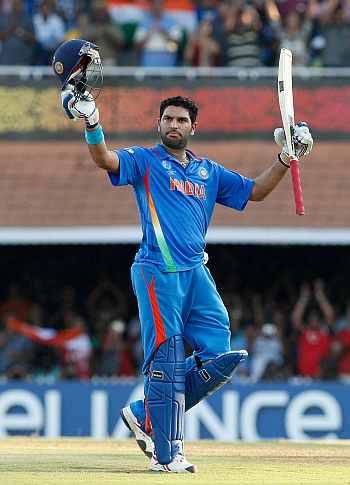
In this ongoing series, we bring you 30 stories of struggle, survival and success to inspire you.
A great leveller, games bring out the best in a human beings, and cricket has plenty of stories of grit and commitment. Chronicles of a quartet.
"Inspired by Armstrong, who fought cancer, Yuvraj steeled himself mentally and physically to withstand chemotherapy"
There is not a single player who has played for some length of time -- in the history of any sports discipline -- who has not been stricken by injury or ill-health.
Only the rare, however, are able to surmount such physical duress -- and its concomitant psychological stress -- to succeed.
Such cases are obviously different from that of say Mansur Ali Khan Pataudi, who overcame the loss of one eye or Bhagwat Chandrashekhar, who became one of the world's great leg spinners though his right hand had been ravaged by polio in childhood.
There are several instances in Indian cricket itself where players have fought off pain, fever and injury -- put mind over matter -- and gone on to perform with excellence.
In his first series in 1970/71 when he made a record 774 runs, Sunil Gavaskar batted through one Test match with a raging toothache.
In 1980/81, when India beat Australia in Melbourne, Kapil Dev bowled tirelessly with a serious shin injury. In the West Indies in 2002, Anil Kumble strapped his fractured jaw and came out to bat in a show of great courage.
The most stirring story, however, is possibly that of Yuvraj Singh, who battled against a malignant tumour the size of a golf ball found just below his lung.
Unknown to anybody -- including perhaps himself -- Yuvraj had played the 2011 World Cup with the cancer gaining ground. He finished as the Player of the Tournament, and ignoring gnawing signs of inexplicable fatigue, toured England where he fractured his finger.
ALSO READ IN THIS SERIES
This Dalit lawyer wants to educate and empower women
The inspiring story of a polio victim's quest for mobility
He ran away from home to become a successful doctor
The Indian hockey player who was rejected 13 times
From stage fright to rejection, this VC has seen it all
IITian rejected by IIM A: What he learned
14-hour power cuts didn't dim his IAS dream
The cowherd who learnt to read and operate computers
Please click NEXT to continue reading
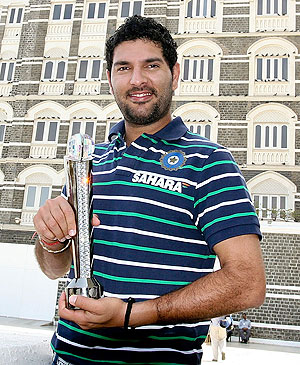
In a quirky sort of way, this turned out to be a blessing in disguise, for he was forced to go through a lot of medical check-ups where the cancer was detected.
Initially, the tumour was thought to be benign, and which could be treated easily. But as the weeks wore on, Yuvraj's condition worsened and the tumour was found to be malignant.
Only 30, this was a sordid blow dealt by fate. A lesser person would have been crushed by the pressure, but Yuvraj took it on the chin and went in for quick therapy.
Inspired by cycling legend Lance Armstrong, who had fought testicular cancer and lived not just to tell the tale but win more titles, Yuvraj steeled himself mentally and physically to withstand the debilitating rigours of chemotherapy.
At the best of times, such illnesses are fought alone. What is needed is not fatalism and self-pity, but mental toughness and the belief that the most adverse condition can be conquered.
By all accounts, Yuvraj Singh has been able to do that.
Aptly, he has changed his twitter handle from @yuvi09 to @yuvstrong12, marking the transition from a wonderfully gifted player to a most courageous one.
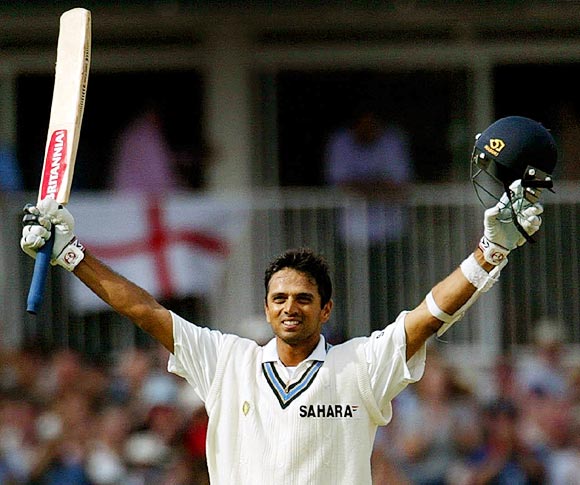
"Every loose delivery was punished, and good delivery given respect. The margin of error for bowlers was miniscule"
On March 14, 2001, when skipper Sourav Ganguly was dismissed with the score reading 232 for 4 in the second innings at Eden Gardens in the Test against Australia, India's goose looked cooked.
This was only the third day of the match, but the home team had been completely outplayed.
India had scored a paltry 171 in reply to Australia's 445.
Ganguly's dismissal in the second innings meant that barring Rahul Dravid, there was no other specialist batsman remaining and the team was still 42 runs in arrears. With more than two days remaining, even playing out time for a draw seemed implausible.
Indeed, there was a ray of hope that Steve Waugh's world champion side would be thwarted in notching up a second successive win, following the one in Mumbai a few days earlier.
It appeared then that Waugh's dream of conquering the 'Final Frontier' i.e., beating India in India was merely a formality that had to be completed.
But the naysayers had not reckoned the resolve and pluck of VVS Laxman and Rahul Dravid. Coming together with their team in a hopeless situation, these two turned the Test around on its head to help India pull off one of the greatest Test match victories in cricket history.
The pair batted all of the fourth day without being separated.
Nothing Waugh and his bowlers hurled at Dravid could faze him.
Every time he was beaten, he refocused on the task on hand and blunted the edge of the Australian attack. With Glen McGrath and Shane Warne, this was no mean attack either.
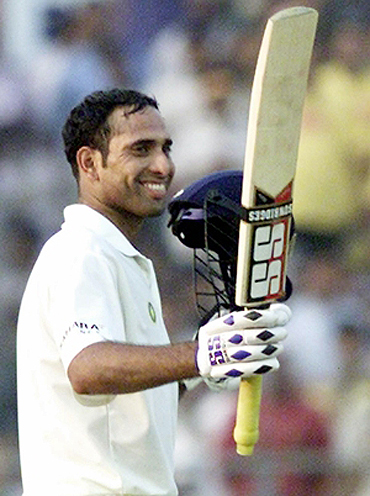
Dravid's partner, Laxman, on the other hand, was all wristy elegance and scintillating strokes.
Every loose delivery was punished, every good delivery given respect. The margin of error for bowlers was miniscule as he cut, drove and pulled with aplomb.
The partnership swelled over by over, session by session till it reached monumental proportions. By the time Laxman was dismissed for 281 on the fifth morning, it was worth a whopping 376 runs.
A little while later, Dravid was run out for a resolute 180, by which time India had reached a big enough total for Ganguly to venture a declaration.
It seemed that Australia would play out easily for a draw. But this massive partnership had not only fatigued the Australian players, but withered them mentally, leaving them terribly vulnerable.
Within the next few hours, Waugh's team was bundled out for 212 runs, leaving India victors by 171 runs. When asked what helped them overcome the daunting situation they had come together in, both Laxman and Dravid said it was because of self-belief.
'No match is won till it is lost,'' said Laxman, "and we had not lost it till then. We took it first over by over, then spell by spell and session by session and turned the pressure on the Australians.''
The abiding moral of this story is, of course, that old cliche: 'Never give up!''
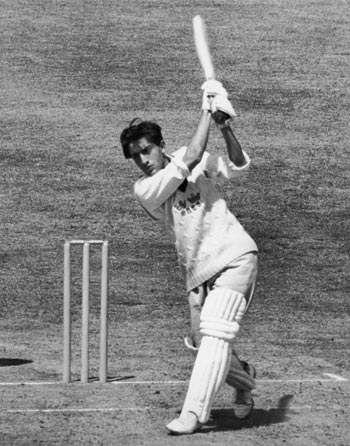
"I refused to accept mentally, that I am not going to play cricket, and blanked out negative thoughts"
The ability to cope with adversity is at the core of any sporting endeavour. There are some striking examples in cricket where players have triumphed over heavy odds by sheer strength of will.
Perhaps the most compelling story from India is that of the late Mansur Ali Khan Pataudi, the middle order batsman and also widely regarded as one of the country's great captains.
Mansur Ali Khan was born into aristocracy. He was also born into sport, as it were, his father Iftikhar Ali Khan, had played for both England (in the Bodyline series against Australia of 1932-33), and India when he captained the side against England in 1946.
Cricket was his passion and calling and when he went to Oxford University, he decided to pursue just this sport.
At the University he was touted as the best young batsman in England. He was adventurous, stroke-filled and charismatic, scoring heavily off even seasoned pros from the county-circuit. The cricket world, it seemed, was at his doorsteps to conquer.
Then tragedy struck; without warning and in such a devastating manner that it appeared Mansur Ali Khan's sporting future was wiped out.
A car accident caused splinters of glass from the windshield pierce his right eye. Even the best medical aid could not prevent 95 per cent loss of visibility in that eye.
Mansur Ali Khan was just about 20 then.
The difficulties of coping with a vision so impaired can hardly be imagined, When he reached out to pick a glass of water, he would miss it by a few inches at least. How much more difficult to pick the line and length of bowlers!
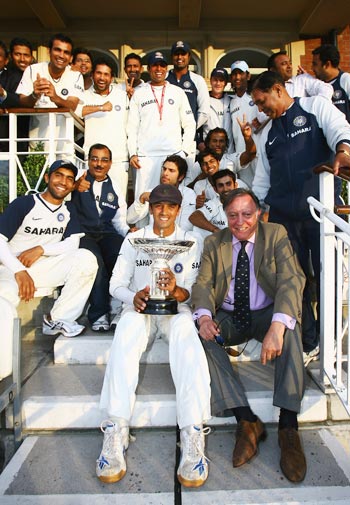
Only a month after the accident he was back in the nets; for nearly a decade he was at the helm, building up an Indian team that would have self-belief rather than the usual defeatism.
Under Pataudi's captaincy, India's spinners thrived like never before: Bedi, Prasanna, Chandrashekhar and Venkatraghavan became international heroes for their skill and craft. This period is popularly known as the Renaissance of Indian cricket.
Personally as a batsman, Pataudi adopted an 'open' stance which would allow him better sight of the ball.
He never became the batsman he looked capable of before his accident, but yet good enough to play at the highest level and score 6 Test centuries.
He was also arguably the finest fielder of his time and nicknamed 'Tiger' for his speed and alacrity.
What helped Mansur Ali overcome such a debilitating injury and scale peaks of excellence?
"There was no way I was not going to play cricket,'' he was to say later.
"I refused to accept that mentally, blanked out negative thoughts and went out and made the adjustments needed."
What emerged from his personal courage and great positive outlook to life is one of the more remarkable stories in the history of cricket.